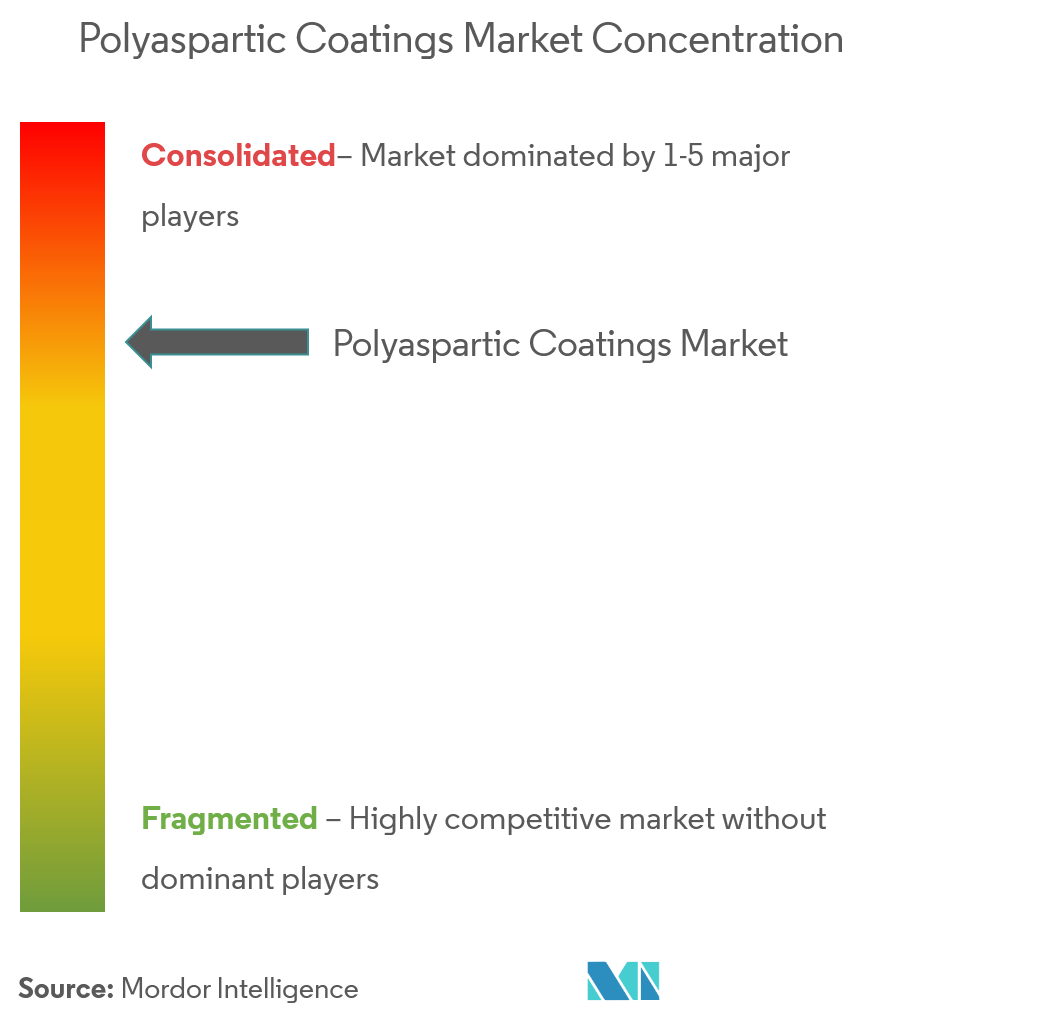Polyaspartic Coatings Market Analysis
The Polyaspartic Coatings Market is expected to register a CAGR of greater than 7.5% during the forecast period.
- Increasing demand for bio-based products is expected to act like an opportunity for the market.
- Asia-Pacific dominated the market across the globe with the largest consumption in a country such as India, China, etc.
Polyaspartic Coatings Market Trends
Marine Segment to Dominate the Market
- The market studied is quite extensive, and is widely used in marine applications. Polyaspartic coatings offer extremely fast dry time and excellent corrosion resistance. These advantages make polyaspartic coatings one of the most attractive solutions in marine applications.
- High film builds, which are applied in marine applications with a thickness of about 150-300 microns, when applied using polyaspartic coatings, allow the application of only fewer coating layers.
- As this coating process is more efficient, the total productivity is increased, which in turn translates into lower overall painting costs and faster return-to-service.
- Some of the other advantages of polyaspartic coatings in marine applications include superior weather, UV, chemical, scratch and stain resistance, long-term color and gloss retention, the high film builds without blistering, and most importantly low volatile organic compound (VOC) content.
- Owing to the increase in demand for new ship orders, the production of ships is expected to rapidly increase, resulting in the growing usage of polyaspartic coatings during the forecast period.
China to Dominate the Asia-Pacific Region
- China is recognized for its architectural boom, globally, owing to the demand for low-cost housing and commercial housing, in recent years. China is currently producing more than half of the Asia-Pacific coatings and is home to more than 10,000 paint companies, among which local producers occupy more than half of the domestic paint market share.
- China has the world’s largest construction industry. However, the growth rate of the industry has become increasingly modest, as the Chinese government is looking to shift toward a services-led economy.
- expressways. China’s transport ministry and the National Development and Reform Commission (NDRC) has announced their plans to invest USD 72 billion to construct transportation projects, including railways, highways, waterways, airports, and urban rail.
- The Chinese shipbuilding industry has integrated military and commercial efforts. Shipyards, that once built only warships, have shifted their expertize and facilities to the construction of freighters and other vessels for commercial purposes, while continuing to build and modernize ships, in response to requirements from the People’s Liberation Army (PLA) Navy and Army.
- Hence, with the rapidly growing building and construction, infrastructure, and marine (shipbuilding) industries, the market for polyaspartic coatings in China is expected to rapidly increase over the forecast period.
Polyaspartic Coatings Industry Overview
The polyaspartic coatings market is a semi consolidated market. Some of the major key players include AkzoNobel NV, BASF SE, PPG Industries Inc., Sika AG, and Covestro AG, amongst others.
Polyaspartic Coatings Market Leaders
-
Akzo Nobel NV
-
BASF SE
-
PPG Industries Inc
-
Sika AG
-
Covestro AG
- *Disclaimer: Major Players sorted in no particular order
Polyaspartic Coatings Industry Segmentation
The polyaspartic coatings market report includes:
| Technology | Water-borne | ||
| Solvent-borne | |||
| Powder Coatings | |||
| Other Technologies | |||
| Type | Pure Polyaspartic Coatings | ||
| Hybrid Polyaspartic Coatings | |||
| End-user Industry | Building and Construction | ||
| Marine | |||
| Infrastructure | |||
| Power Generation | |||
| Other End-user Industries | |||
| Geography | Asia-Pacific | China | |
| India | |||
| Japan | |||
| South Korea | |||
| Rest of Asia-Pacific | |||
| North America | United States | ||
| Canada | |||
| Mexico | |||
| Europe | Germany | ||
| United Kingdom | |||
| Italy | |||
| France | |||
| Rest of Europe | |||
| South America | Brazil | ||
| Argentina | |||
| Rest of South America | |||
| Middle East & Africa | Saudi Arabia | ||
| South Africa | |||
| Rest of Middle East & Africa | |||
Polyaspartic Coatings Market Research FAQs
What is the current Polyaspartic Coatings Market size?
The Polyaspartic Coatings Market is projected to register a CAGR of greater than 7.5% during the forecast period (2025-2030)
Who are the key players in Polyaspartic Coatings Market?
Akzo Nobel NV, BASF SE, PPG Industries Inc, Sika AG and Covestro AG are the major companies operating in the Polyaspartic Coatings Market.
Which is the fastest growing region in Polyaspartic Coatings Market?
Asia Pacific is estimated to grow at the highest CAGR over the forecast period (2025-2030).
Which region has the biggest share in Polyaspartic Coatings Market?
In 2025, the Asia Pacific accounts for the largest market share in Polyaspartic Coatings Market.
What years does this Polyaspartic Coatings Market cover?
The report covers the Polyaspartic Coatings Market historical market size for years: 2019, 2020, 2021, 2022, 2023 and 2024. The report also forecasts the Polyaspartic Coatings Market size for years: 2025, 2026, 2027, 2028, 2029 and 2030.
Our Best Selling Reports
Polyaspartic Coatings Industry Report
Statistics for the 2025 Polyaspartic Coatings market share, size and revenue growth rate, created by Mordor Intelligence™ Industry Reports. Polyaspartic Coatings analysis includes a market forecast outlook for 2025 to 2030 and historical overview. Get a sample of this industry analysis as a free report PDF download.






